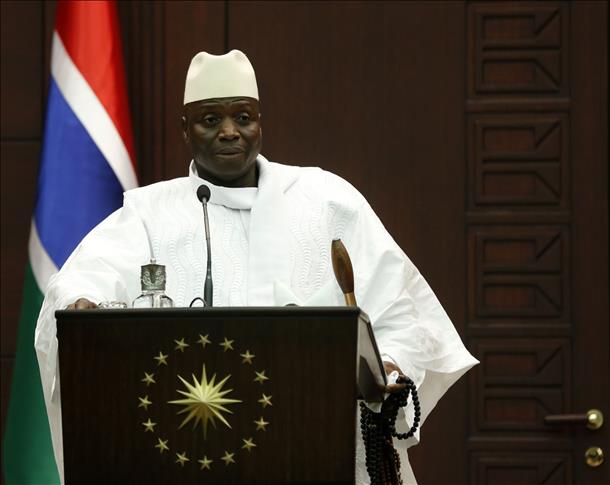
By Haddija Jawara
BANJUL
Yahya Abdul-Aziz Jemus Junkung Jammeh was born on May 25, 1965.
Only 29 years later, he became the president of Gambia through a bloodless coup and has since ruled the West African country with what many describe as an iron fist.
On July 22, 1994, Jammeh – then a young army officer – and a group of equally young colleagues seized control of key facilities in the capital Banjul and deposed President Dawda Jawara.
The Armed Forces Provisional Ruling Council, as the young officers dubbed themselves, suspended the national constitution, imposed a curfew and closed Gambia's borders.
Jammeh, who has received military training in Senegal and in the U.S., was promoted from lieutenant to captain and as council chairman became the de facto head of state.
Two years later, he rose to the rank of colonel before retiring from the army.
Since 1996, Jammeh has been elected president in four elections.
In 2011, he won 72 percent of the vote, according to official results.
But on Dec. 30, Banjul residents awoke to the sound of gunfire in and around the presidential palace.
As day broke, commuters heading to Banjul for work were turned back at the Denton Bridge – the only access road into the capital – by security forces.
President Jammeh, who has since returned to the country from a visit abroad, blamed the failed coup on Gambian dissidents based in Germany, the U.K. and the U.S.
On Monday, the U.S. Justice Department filed a criminal complaint against two U.S. citizens of Gambian descent for their involvement in the failed coup.
Cherno Njie, 57, and Papa Faal, 46, are both in police custody.
"The defendants stand accused of conspiring to carry out the violent overthrow of a foreign government in violation of U.S. law," U.S. Attorney-General Eric Holder declared.
"The U.S. strongly condemns such conspiracies. With these serious charges, the U.S. is committed to holding them fully responsible for their actions," he said.
'Gifted'
Jammeh's official title reads, "His Excellency Sheikh Professor Alhaji Dr. Yahya Abdul-Aziz Jemus Junkung Jammeh."
According to the website of State House, Jammeh is commander-in-chief of the army and "chief custodian" of the country's "sacred" constitution.
Jammeh also serves as defense minister and supervises several government departments.
In 2007, President Jammeh claimed he had the power to cure AIDS with the help of an herbal remedy.
According to State House, Jammeh also possesses "extensive knowledge of traditional herbal therapy, especially in the treatment of asthma and epilepsy."
Rights abuses
The Jammeh regime is accused of committing human rights violations which include disappearing opponents and detaining dissidents for long periods without charge or trial.
In 2000, the government was accused of killing 12 students and a journalist during a student protest.
"The government of Yahya Jammeh continues to spread fear and to exercise extreme intolerance to any form of dissent in Gambia," Amnesty International said in a report in Dec. 2014.
"Human rights defenders, journalists, political opponents, critics of government policy, public officials and citizens face intimidation, harassment, death threats, arbitrary arrests, incarceration, torture and other cruel, inhuman or degrading treatment, enforced disappearances and extrajudicial executions," it added.
Amnesty cited the shooting dead of Deyda Hydara, editor of The Point tabloid and a government critic, in late 2004.
The murder came three days after the government approved a controversial law which he had vehemently criticized.
The Economic Community of West African States (ECOWAS) Court of Justice had condemned Gambia for the torture of journalist Musa Saidykhan in 2006 and the enforced disappearance of journalist Ebrima Manneh in 2004.
As part of a crackdown on the press, Gambia's parliament amended the country's criminal code in 2013 to allow five-year jail terms on anyone convicted of disseminating "false information."
In a sign of dissatisfaction with the regime, ECOWAS refused to endorse Jammeh's electoral win in 2011.
At the time, the regional bloc had asserted that Gambia's opposition and voters had been "cowed by repression and intimidation."
In the same year, Jammeh pulled Gambia out of the Commonwealth of Nations – which consists primarily of former British colonial territories – after 49 years of membership.
At the time, Gambian state television had dismissed the Commonwealth as a "neo-colonial institution… [and] an extension of colonialism."
Anadolu Agency website contains only a portion of the news stories offered to subscribers in the AA News Broadcasting System (HAS), and in summarized form. Please contact us for subscription options.


